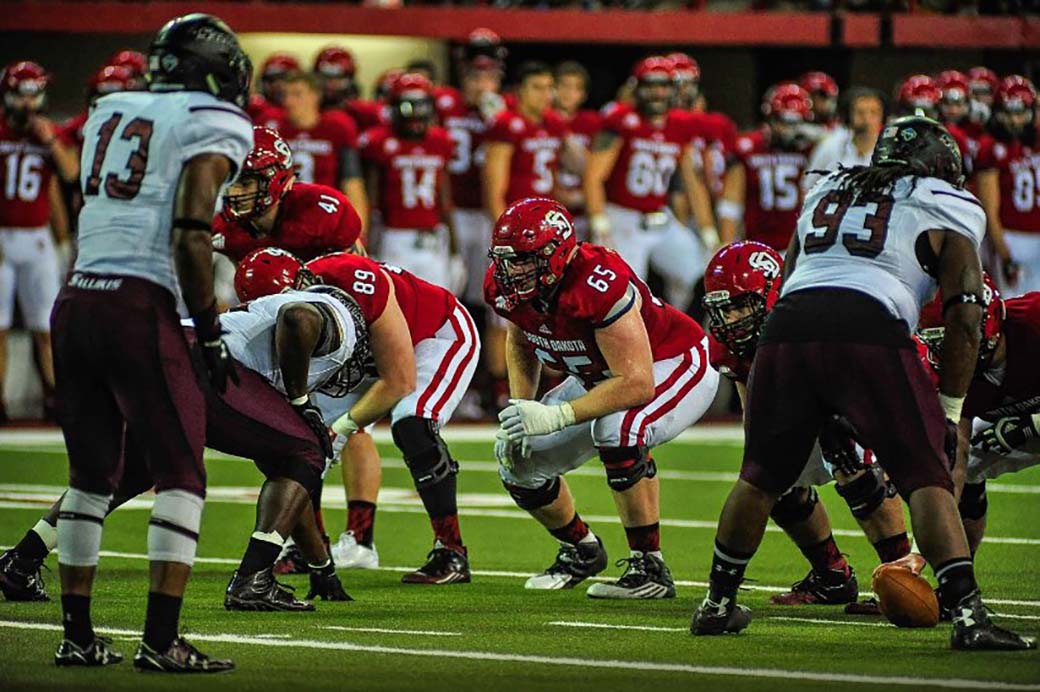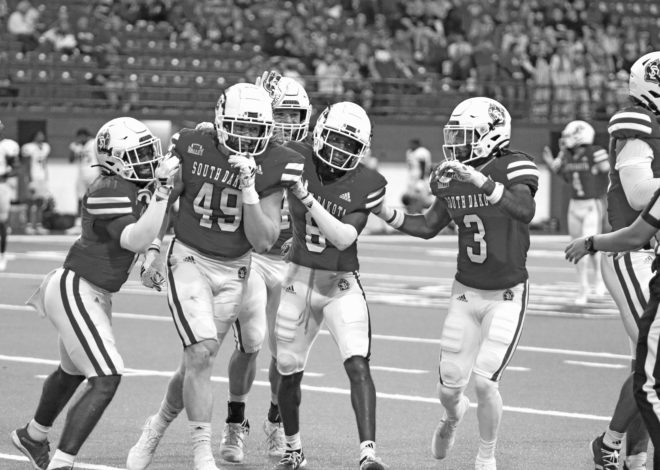
Student-athlete lives hectic, not without ridicule
After playing football since little league, through high school and the past five years here at the University of South Dakota, this marks my first fall without strapping on pads and a helmet since I was 10-years-old and in the fifth grade.
Since middle school, football was the sport I loved the most; however, I can confidently say I wouldn’t have been the same individual without having participated in other sports while I was growing up. Looking back, I played nearly every sport available to me until I received a football scholarship. From wrestling to baseball, basketball to track and field — more field than track — if it was feasible and I could fit it into my schedule, I did it every year. I was proud to be a multi-sport student athlete from the time I was in kindergarten until I graduated high school.
The priceless experiences I gained through participation in these sports, the deep relationships I developed and the ubiquitously pertinent life lessons I acquired, from time management to perseverance, truly are elements of my being. They serve to explain my habits and describe my personality. These characteristics shaped me as an individual and continue to define me today. There is no doubt, if I am so blessed, my offspring will be highly encouraged to participate in athletics throughout their developing years.
My first year not participating in a sport since kindergarten has galvanized a new, fascinating perspective for me. I’ve been able to truly witness and absorb the unfiltered perception that others of my newly-adopted status possess regarding student-athletes. While I’ve always been astutely aware of the obvious stereotypes that exist regarding student-athletes and their approach to academics or other aspects of life outside their sport, I must say, I have been utterly astounded by the intense brevity to judgement that exists on this topic.
While I may be referring specifically to the sport of football, I’m certain these comments are applicable to nearly every sport and are relevant to all collegiate student-athletes. I specifically reference football, because it happens to be the sport I personally know and love. To those who may be unfamiliar with the life of a student-athlete, let me take this opportunity to shed a little light on the experience I had participating in the sport with which I’m familiar.
Nearly every day, both in season and out, we would wake up before dawn for position meetings. There we would critique film from yesterday’s practice with our position coaches, schematically prepare for the practice that awaits us in the afternoon and thoroughly examine the game film of the opposing team we are scouting that week and will face in Saturday’s game. Thorough preparation is a major aspect of a student-athlete’s life and a quality characteristic that all are familiar with. But mental preparation isn’t the only form.
Following our position meeting, the next event on our morning agenda was our mandatory weightlifting session. I say “mandatory” not from the standpoint that it was required procedurally, though it was, but rather because it was personally mandatory. A football player must maintain enough physical strength and endurance to optimize their abilities through an 11-week-long football season. Otherwise, a season filled with blowouts both on the scoreboard and within the knee joint are inevitable.
Breakfast follows weightlifting and all of this is achieved before the earliest class even begins. After a day full of classes, football players go to pre-practice position meetings in the early afternoon followed by pre-practice prep and practice until around 6 p.m., but the day isn’t over yet. Like all students, leisure time must be devoted to homework. Unlike most students, film from the day’s practice must be watched and game week preparation must also ensue.
It is at best a major generalization and at worst an entirely unfounded fallacy that student-athletes are all lazy, don’t try hard or don’t pay attention in school. The reputation of student-athletes may always be riddled with entirely false and unfair stereotypes like this. While I will never condone laziness, the next time you see a football player falling asleep in class, have some perspective and think for a moment what they went through before you ate breakfast this morning.
I’m not suggesting that student-athletes get extra sympathy for what they go through on a daily basis. Being a student-athlete is entirely voluntary. Those who complain about their status as a student athlete don’t deserve to be one. I am, however, suggesting that unfair preconceptions and extreme generalizations about student-athletes and their special treatment exist at reprehensible amounts within all student populations across the country and an inclination to accept the all too popular stereotypes is absurd.
My message to those who have played the game at the collegiate level: don’t disrespect the game, or your years of personal sacrifice and dedication to it, by letting any obstacle in the “real world” outside of football get in your way. A lifetime of challenges may front a facade of difficulty or even impossibility, but this is simply because those particular challenges are unfamiliar. If you know what it’s like to grind through fall camp in the August heat, to sacrifice blood, sweat and tears for 60 minutes of “all you’ve got” — don’t just throw this experiences away.
My message to those who didn’t have the opportunity to participate in collegiate athletics: before you judge a student-athlete based on an entirely unfounded stereotype or something you heard from someone else, get to know one of them first. Like my mother always says, “If you don’t like somebody, it’s probably because you don’t know them well enough.”

